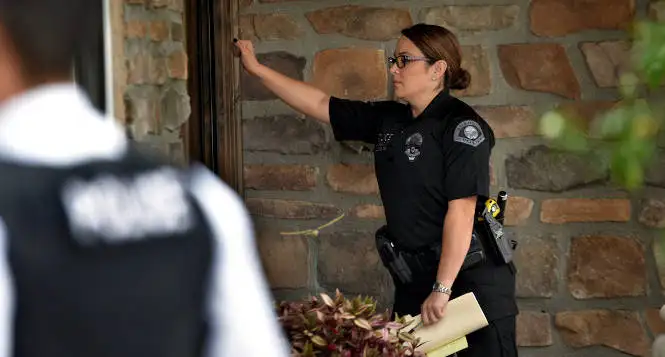It’s very annoying (sometimes very troubling) to see cops knocking or coming to your door frequently. Whether they’re asking questions or telling you something they think you should know, it is very annoying if you want to keep a certain level of privacy and they aren’t giving it to you at all. So you might wonder one day how many times police can legally come to your house without it being considered some sort of harassment from the police on you. Well you’ve come to the right place, let’s hop right into it.
Table of Contents
Why The Police Come To Your House In The First Place
They’re Responding To A 911 Call From Your House Or Your Neighbor’s House
The first and most obvious reason as to why the police come to your door is that they may have received a call from you or a neighbor (who may be reporting something.) Maybe you called the cops because someone is behaving uncharacteristically at your house, or maybe your neighbor heard some noises coming from your place and so they decided to call the police on your house. If you’re having a party and you’re making noise, or creating noise pollution as it is known. Your neighbors (or residents in your neighborhood) are likely to call the cops on you if you did not alert them prior to the party or if they ask you and you do not heed to their requests. If the police ask you to shut down something and you continue after they’ve left. They can come back to your house and arrest you for being an obstruction to justice. In most cases you will not have the luxury of having the police come to your house multiple times, if it is you who’s the problem you will be rightly arrested.
They’re Looking To Question You As A Potential Witness To A Crime
Whether the crime happened in your neighborhood or a place which you frequently visit, the police can come to your place multiple times if they know you’re a witness to a crime. If they’re looking to question you, they may come to your house as much as possible to get as many details as they can about the crime you may have witnessed. If you do not comply to the questioning you may be considered a suspect or accomplice to that crime so it is very important to comply. They may also frequently visit your house to see if your testimony or account of witnessing is consistent with your past accounts or whether you’re forging your testimony (which they will be able to decipher if your current testimony is not consistent with your previous testimony of the crime.) It is very important to calm down when talking to the police and if you have no reason to lie then you definitely shouldn’t.
They’re Serving A Search or Arrest Warrant
The police can come to your house as many times as they please if it is suspected to be harboring things that are against the law like deadly explosives, narcotics, dangerous chemicals, etcetera. With a search or arrest warrant the police do not even have to ask foe your permission to enter your house. They can simply do so because under the warranty, it is within their legal right to storm into your house.
Your Legal Right As A Citizen
- You should know that if the police come to your place of residence without a search or arrest warrant, you have a right to say no to anything they might ask you to consent for. You have a right to say no if they want to enter your property without a warrant. However if the police have reason to believe that somebody in the house is injured, in danger or up to no good such that they’re a danger to the surrounding civilians, they may enter without a search warrant.
- Even when the police officers have a search warrant, they have to knock at your door and announce themselves before they enter. However if you do not respond to the knock they can break down your door and enter. Because you might be hurt or guilty (and choose to run away.)
More About The Police Coming To Your House
- You would be better served complying with the police officers, even when you’re annoyed or right about something. If you do not comply you are likely to get arrested without hesitation. You have to know that the police officer has all the power in any given situation.
- If the police come to your door with a search warrant. It is within your legal right as a citizen to receive or ask for a copy of the search warrant as proof of the legality of the search.
- It is also within your legal right to ask for a card with the police officer’s name, badge number and also the incident number, if you would like to share something about the police officer with the higher ups.
Conclusion
So there you have it. Police can come to your house as many times as possible. So long as they operate under the laws of the state, because not even police officers are above the law. If you feel the police have not carried themselves in a manner that is lawful then you can report them or get an attorney to then take the matter to court. You have rights as both a citizen and property owner in the United States, so it is best to know them and how to use them to avoid being taken advantage of. But police officers also have lines they can cross to ensure the safety of other citizens. Like when they’re surveiling your home and they happen to notice someone flashing dangerous chemicals down the toilet, etcetera. In such as case, the police can break down the door of your house without question and enter therein.

